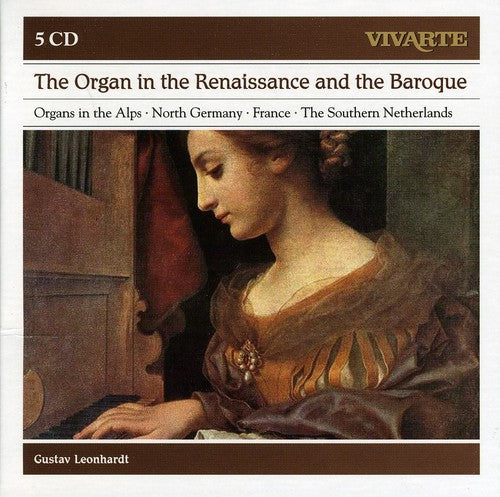1
/
of
1
ORGAN IN RENAISSANCE & BAROQUE
ORGAN IN RENAISSANCE & BAROQUE
Regular price
$21.98 USD
Regular price
$21.98 USD
Sale price
$21.98 USD
Unit price
/
per
Shipping calculated at checkout.
Couldn't load pickup availability
Reviews of some of the original recordings that make up this set:
This anthology is quite a treasure trove of experiences. The instruments are all small ones, but without exception extraordinarily versatile. The oldest one (1599) in Churburg Castle, a mean-tone instrument, has a Filomena (Nightingale) stop, which may be heard in the anonymous gagliarda Lodesana and a Geswitscher (Twittering) stop evident in the Ammerbach prelude. Gustav Leonhardt has carefully planned his programme to demonstrate each organ's characteristics. For instance, the gospel organ at Muri (presumably so named because of its position on the Gospel, or south side of the chancel, where it could play or accompany appropriate music before the Gospel reading) has the old unequal temperament, and the effect of this is strikingly evident in Merula's chromatic caprice, which inevitably produces the occasional howl. Pasquini's Ricercare No. 4 demonstrates the very beautiful flutes. This organ really does wash the ears. 1 found the Stams organ hardest to take for long. Its brightness is a little overpowering. But then, there is no point in playing the whole lot through in one go. The playing throughout is a delight, beautifully articulated and phrased, and the recording quality is always clear and direct.
-- G. R., Gramophone
-----
Leonhardt's recordings as an organist are too rare. No other player can draw such poetic intensity, and with such patrician restraint, fromjust a single stop. Even in full rhetorical flight, he conveys the impression of projecting not for an audience in general but for the single listener in particular: the grave lyricism of Deiphin Strungk's Lass mich Dein sein is as compelling as the stuttering, inebriate humour of Reincken's G minor Fugue. The organs here are both historic and beautiful—the 33-stop instrument in Roskilde Cathedral, restored by Marcussen between 1988 and 1991 (Denmark's only substantial organ of the seventeenth century and earlier) and the second largest of all Schnitger's surviving organs in Germany, the four manual, 47-stop instrument at Norden in East Friesland, brilliantly restored by Jurgen Ahrend in the early 1980s. Leonhardt's fans will read no further; the disc is certainly an enjoyable collection from the German seventeenth century."
-- P. R., Gramophone
This anthology is quite a treasure trove of experiences. The instruments are all small ones, but without exception extraordinarily versatile. The oldest one (1599) in Churburg Castle, a mean-tone instrument, has a Filomena (Nightingale) stop, which may be heard in the anonymous gagliarda Lodesana and a Geswitscher (Twittering) stop evident in the Ammerbach prelude. Gustav Leonhardt has carefully planned his programme to demonstrate each organ's characteristics. For instance, the gospel organ at Muri (presumably so named because of its position on the Gospel, or south side of the chancel, where it could play or accompany appropriate music before the Gospel reading) has the old unequal temperament, and the effect of this is strikingly evident in Merula's chromatic caprice, which inevitably produces the occasional howl. Pasquini's Ricercare No. 4 demonstrates the very beautiful flutes. This organ really does wash the ears. 1 found the Stams organ hardest to take for long. Its brightness is a little overpowering. But then, there is no point in playing the whole lot through in one go. The playing throughout is a delight, beautifully articulated and phrased, and the recording quality is always clear and direct.
-- G. R., Gramophone
-----
Leonhardt's recordings as an organist are too rare. No other player can draw such poetic intensity, and with such patrician restraint, fromjust a single stop. Even in full rhetorical flight, he conveys the impression of projecting not for an audience in general but for the single listener in particular: the grave lyricism of Deiphin Strungk's Lass mich Dein sein is as compelling as the stuttering, inebriate humour of Reincken's G minor Fugue. The organs here are both historic and beautiful—the 33-stop instrument in Roskilde Cathedral, restored by Marcussen between 1988 and 1991 (Denmark's only substantial organ of the seventeenth century and earlier) and the second largest of all Schnitger's surviving organs in Germany, the four manual, 47-stop instrument at Norden in East Friesland, brilliantly restored by Jurgen Ahrend in the early 1980s. Leonhardt's fans will read no further; the disc is certainly an enjoyable collection from the German seventeenth century."
-- P. R., Gramophone
Share

Product Description:
-
Release Date: June 10, 2016
-
UPC: 886979645721
-
Catalog Number: 88697964572
-
Label: Sony Masterworks
-
Number of Discs: 5
-
Composer: Ammerbach, Blitheman, Bohm
-
Performer: Gustav Leonhardt

